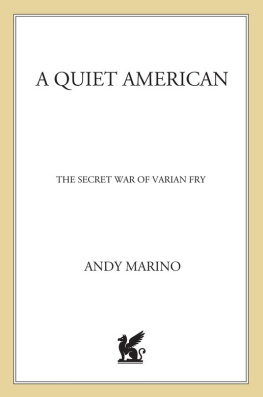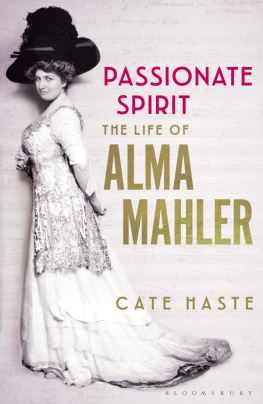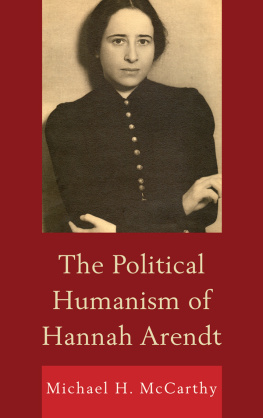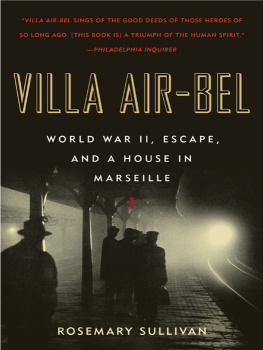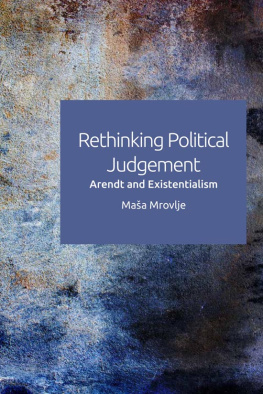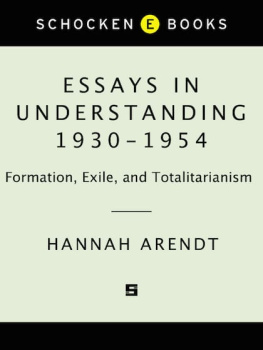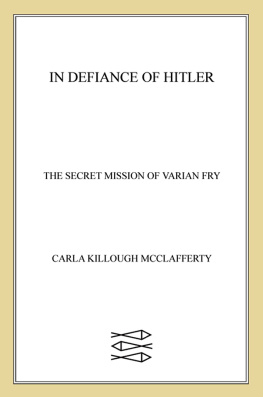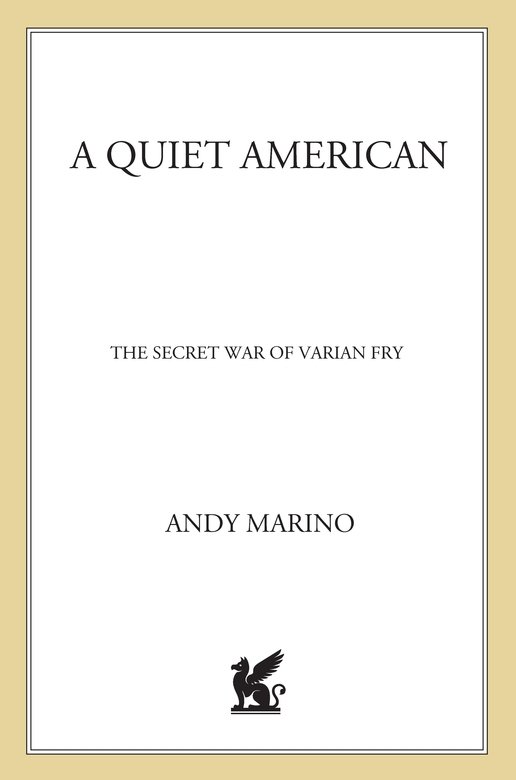PART 1: THE LITTLE PRINCE
1. Berolina
Page 3 The Pension Stern: See note in Fry Papers, Box 6.
Page 3 Fry always made: For background on Berlin during the thirties see the opening chapter of Anthony Heilbut, Exiled in Paradise.
Page 3 Another guest: see Fry Papers, Box 6.
Page 4 All the dubious glamour: See Milton Mayer, They Thought They Were Free, p. 51.
Page 5 When he reached: This section is based on a detailed report by Fry of the riot that was published in the New York Times, July 17, 1935.
Page 7 spurts from the knife: Varian Fry, The New Republic, December 21, 1942, p. 816.
Page 7 The storm troopers laughed: See Mary Jayne Gold, Crossroads Marseille, 1940, p. xv.
Page 8 Fry had already asked for: This section is based on another report from Fry in the New York Times, July 27, 1935.
Page 9 As one old Harvard man: Varian Fry, The New Republic, December 21, 1942, pp. 81617.
Page 9 The moderates believed: For evidence of how early on the Madagascar scheme was floated, see Henry Feingold, The Politics of Rescue, pp. 57, 119.
Page 9 Fry pushed Hanfstaengel: Letter from Fry to Rev. Robert A. Graham in Rome, March 16, 1967 ( Fry Papers , Box 4).
Page 10 What made Hanfstaengel: For a discussion of this subject, see Mayer, They Thought They Were Free, Chapter 12.
2. Dont Be a Goop
Page 12 Varian Mackey Fry: This section is based on interviews between Donald Carroll and cousin Libby (Elizabeth Richardson Garrabrants) in 197778, and between the author and Annette Fry in 1998.
Page 12 In fact Frys father: Letter from Fry to Miss Betty Paysner of the International Rescue Committee, April 22, 1963 ( Fry Papers , Box 5).
Page 13 There survive as a kind of family snapshot: see Fry Papers , Box 10.
Page 14 At school he displayed: Lincoln Kirstein, Mosaic Memoirs , p. 102.
Page 16 Nineteen twenty-six was also the year: Letter from Johannes Skanck Martens to Fry, April 26, 1967 ( Fry Papers , Box 6).
Page 17 By the time he reached Harvard: Lincoln Kirstein, Mosaic Memoirs , p. 101.
Page 17 In receipt of an allowance: Annette Fry, interview with the author, 1998; Lincoln Kirstein, Mosaic Memoirs , p. 101.
Page 18 The plan was: Lincoln Kirstein, Mosaic Memoirs , pp. 103, 104.
Page 18 But Frys confidence: Margaret Scolari Barr, Rescuing Artists in WWII, 1980 (personal communication from Annette Fry).
Page 18 very undisciplined student: Letter from Fry to Harvard Professor of Classics William Chase Green, September 3, 1942 ( Fry Papers , Box 6).
Page 19 Despite the split: Annette Fry, interview with the author, 1998.
Page 20 case of emotional maladjustment: Letter from Fry to A. C. Hanford, Dean of Harvard, September 10, 1945 ( Fry Papers , Box 4).
Page 20 In the late afternoon: Letter from Fry to Eileen June 15, 1932 ( Fry Papers , Box 6).
Page 21 so carefully concealed at the time: Letter from Eileen to Fry, May 25, 1941; letter from Eileen to Fry, September 7, 1941 ( Fry Papers , Box 3).
Page 21 Granville Hicks, the critic and writer: Personal communication from Annette Fry, 1997.
Page 23 A few weeks earlier: Klaus P. Fischer, Nazi Germany: A New History, p. 409.
3. Sign of the Times
Page 24 The press was waiting: New York Times, July 27, 1935.
Page 25 The only man prepared: Fischer, Nazi Germany: A New History, p. 411.
Page 26 George Orwell wrote: George Orwell, The Collected Essays, Journalism and Letters, Volume 1, p. 565.
Page 27 Frys first real adversity: This is based on Donald Carroll, interview with Harold Oram, mid-seventies.
Page 28 for all future time: Fry letter to Daniel Bndite, May 12, 1942, p. 5 ( Fry Papers , Box 2).
Page 30 In July 1937: For a lucid discussion, see John Pimlott, The Viking Atlas of World War II , p. 30.
Page 31 his brides enthusiasm: Heilbut, Exiled in Paradise , p. 31.
4. Some Call It War
Page 33 long and terrible experience: See Fry Papers, Box 11, p. 148.
Page 33 In 1935, when he first came to New York: Donald Carroll, interview with Anna Caples-Hagen, mid-seventies.
Page 34 a teenage terrorist in Paris: See Victor Serge, Memoirs of a Revolutionary, Chapter 1.
Page 35 In the summer of 1939: See Frys notes ( Fry Papers , Box 8).
Page 36 a world revolution: See Frys notes ( Fry Papers , Box 17).
Page 36 favorite midtown restaurant, Childs: It was the one on Forty-second Street.
Page 36 British overconfidence: See Benjamin Welles, Sumner Welles, F.D.R.s Global Strategist , p. 258.
Page 37 The storm finally broke: One of the finest accounts of this period is Telford Taylor, The Breaking Wave: The Second World War in the Summer of 1940.
Page 39 idealism was useless: Donald Carroll, interview with Harold Oram.
Page 41 the back of its neighbor: New York Times , June 11, 1940, p. 6.
Page 41 THE CHAMPS-ELYSEE: New York Times , June 15, 1940, p. 1.
Page 41 ambassador to Francos Spain: For a full discussion of the events at this time, see Ian Ousby, Occupation: The Ordeal of France , 19401944, Chapter 1.
Page 42 TERMS TO CRUSH FRANCE: New York Times, June 19, 1940, p. 1.
Page 42 AT COMPIEGNE TODAY: New York Times, June 21, 1940, p. 1.
Page 42 FULL FRENCH SURRENDER: New York Times, June 22, 1940, p.
Page 42 HALF OF FRANCE: New York Times, June 24, 1940, p. 1.
5. The Accidental Tourist
Page 44 who can get them out: Donald Carroll, interview with Anna Caples-Hagen.
Page 45 On June 4, Mann, in California: See Anthony Heilbut, Exiled in Paradise, p. 40.
Page 46 best novelists in the world: Ernest Hemingway, Selected Letters, p. 531.
Page 47 never mind Jews and Communists: see Henry L. Feingold, The Politics of Rescue, p. 132.
Page 47 membership in polite society: Otto Friedrich writes most vividly of this in City of Nets, pp. 4748.
Page 47 to petition her for help: Cynthia Jaffee McCabe, Wanted by the Gestapo: Saved by America, in The Muses Flee Hitler, p. 80.
Page 47 political persecution to land: Mary Jayne Gold, Crossroads Marseille, 1940, p. xv.
Page 48 Fry had told Hagen confidentially: Fry, draft MS (Fry Papers , Box 11).
Page 49 uninvolved and rigidly neutral: For a good account of contemporary frustration with the isolationists and the Monroe doctrine, see Clare Booth (Luce), European Spring, p. 305.
Page 50 its director there, Richard Allen: See letter to Fry from James T. Nicholson, assistant to the chairman of the Red Cross ( Fry Papers , Box 10).
Page 50 Thus armed, Frys next task: See Fry Papers, Box 1, Box 10.
Page 50 BRIEF APPOINTMENT?: Fry, undated cable to Ambassador William C. Bullitt ( Fry Papers, Box 10).
Page 50 already in a rocky state: The best description of these hateful conditions is to be found in Benjamin Welles, Sumner Welles, F.D.R.s Global Strategist, esp. p. 263. A broader and very enlightening account of interdepartmental and international tensions involving the State Department at this time is in A Man Called Intrepid, by William Stevenson.
Page 51 twelve submachine guns: Benjamin Welles, Sumner Welles, F.D.R.s Global Strategist, p. 260.
Page 51 Monday morning, July 29: See Fry Papers, Box 10.

